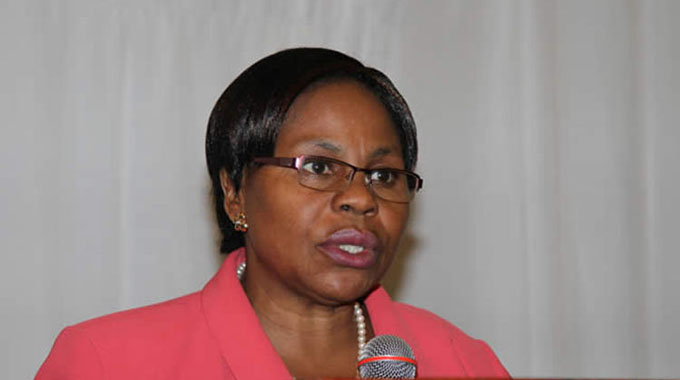Diaspora women donate sanitary wear

Manicaland Correspondent
Zimbabwean women in the Diaspora have pledged to supply sanitary wear for female students and other less-privileged women in Manicaland Province, Minister of State for Manicaland Provincial Affairs Cde Monica Mutsvangwa has said.
Minister Mutsvangwa made the announcement during a meeting with development partners at Mutare Hall last Friday. After a briefing by the director of Chiedza Community Welfare Trust, Mrs Gladys Mukaratirwa, on the difficulties faced by young women in rural areas in securing sanitary wear, Minister Mutsvangwa said she would soon mobilise the Diasporans to release the sanitary pads, which would be donated to schools.
“I once heard from 20 local chiefs that many girls in remote areas skip at least five days of school every month because they do not have sanitary wear,” she said. “This will obviously affect their performance academically.”
Minister Mutsvangwa said she would liaise with Chiedza Community Welfare Trust to mobilise the sanitary wear. Mrs Mukaratirwa said her organisation was running programmes on women and girls’ health, including menstrual health management in schools.
“An observation that we have made over a period of time, especially among orphaned and vulnerable adolescent girls that we are supporting with school fees, is that they are still missing out on lessons due to lack of sanitary pads, yet their performance has improved,” said Mrs Mukaratirwa.
“We checked their school reports on attendance and realised most girls missed between two and five days per month. We interviewed some of the girls and they cited lack of secure, dependable sanitary wear and the stigma it caused when they spoiled their outer garments at school.”
Mrs Mukaratirwa said her organisation produced reusable sanitary pads, which were distributed to needy young girls and women.
“Menstrual health awareness is given to both adolescent boys and girls, young women and men,” she said. “Boys and men should embrace what the girls and young women are going through, to remove stigma.
“We also encourage household budgets to include sanitary pads for the girl child and young women at home.”
Meanwhile, civic organisations have called on Government to align marriage laws with the Constitution and end the scourge of child marriages.
In a recent interview, Simukai director Mrs Barbara Matsanga said the existing laws that were at odds with the Constitution were increasingly frustrating efforts to curb the social evil.
Advocacy consultant with Simukai Mrs Tafadzwa Kaja said calls by both public and private sectors on Government to amend the Marriage Act and other relevant laws that were still at odds with the Constitution seemed to be going unheeded.
“There is need to realign laws, as delays by the Government have resulted in some perpetrators getting away with this conduct because the law as of now is not watertight, and as long as it remains that way, perpetrators will continue to roam our streets,’’ said Mrs Kaja.
There are reportedly high cases of child marriages in Manicaland, especially in the Odzi, Marange and Mutasa communities, with people linking the evil to poverty and religion.
Critics say Section 21 of the the Marriage Act (Chapter 5:11) allows the marriage of minors by written consent of their legal guardian(s), and if for whatever reason consent cannot be obtained, a High Court judge may grant consent to the marriage.
According to Mrs Matsanga, efforts to curb child marriages were being hampered by the lack of a law to bring perpetrators to book.
“Even reported cases of child abuse and child marriages have low success rate in courts due to inadequate legal framework,’’ she said.
Mr Tanaka Adrian Mbotshwa, a lawyer, added that the disharmony in the laws on child marriages was illsutrated by the fact that the Criminal Law Code (Chapter 9:23) stipulated or put a benchmark on the age of consent for sexual intercourse.
“The criminal code criminalises those perpetrators who have sexual intercourse with a person who is below the age of 16 years,” he said. “There is, therefore, a disharmony in the laws and a gap that has to be filled in the laws on child marriages.
“The question that bogs one’s mindset is whether or not a person aged 17 years old can start a family,”Mr Tanaka said.










Comments